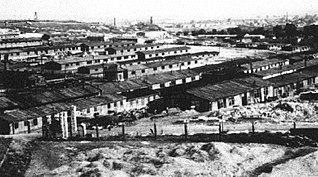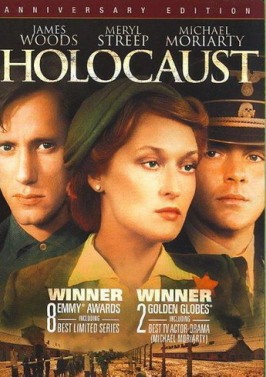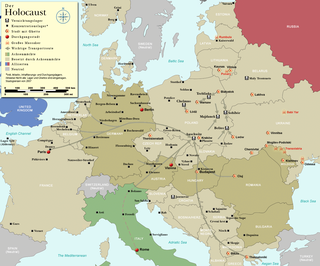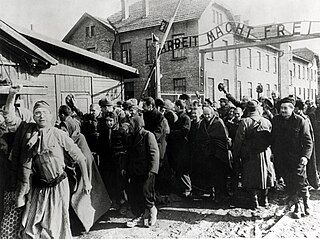This biography may need clean up.(December 2009) |
Henry M. Golde (May 5, 1929 - October 18, 2019) [1] [2] was an author and childhood survivor of the Holocaust. He wrote about his experiences in his book Ragdolls. [3]
This biography may need clean up.(December 2009) |
Henry M. Golde (May 5, 1929 - October 18, 2019) [1] [2] was an author and childhood survivor of the Holocaust. He wrote about his experiences in his book Ragdolls. [3]
Golde was born in Płock, Poland located west of Warsaw. At age 11 he was taken by the SS to the district of Galicia, Poland. There he was spared from the gas chambers when selected as fit for a work camp. He spent the next five years in nine different Nazi concentration camps in Poland, Germany, and Czechoslovakia.
He survived starvation, typhoid fever, and a two-week death march to Czechoslovakia. He lost his entire family due to the war. He was liberated from the Theresienstadt concentration camp by the Russians and was then placed in a children's home for four months. Golde spent seven years in England, including two years in the Royal Navy, before emigrating to the United States.
He later resided in Appleton, Wisconsin until his death on October 18, 2019.
In 2008, Golde received an award for outstanding educator of the year from the Wisconsin State Human Relations Association. [4]

Shoah is a 1985 French documentary film about the Holocaust, directed by Claude Lanzmann. Over nine hours long and 11 years in the making, the film presents Lanzmann's interviews with survivors, witnesses and perpetrators during visits to German Holocaust sites across Poland, including extermination camps.

The Romani Holocaust or the Romani genocide was the planned effort by Nazi Germany and its World War II allies and collaborators to commit ethnic cleansing and eventually genocide against European Roma and Sinti peoples during the Holocaust era.
Melvin Mermelstein was a Czechoslovak-born American Holocaust survivor and autobiographer. A Jew, he was the sole survivor of his family's extermination at Auschwitz concentration camp.

This is a selected bibliography and other resources for The Holocaust, including prominent primary sources, historical studies, notable survivor accounts and autobiographies, as well as other documentation and further hypotheses.

Holocaust (1978) is an American television miniseries which aired on NBC over four nights, from April 16 — April 19, 1978.
The Holocaust has been a prominent subject of art and literature throughout the second half of the twentieth century. There is a wide range of ways–including dance, film, literature, music, and television–in which the Holocaust has been represented in the arts and popular culture.

George Jiri Brady was a Holocaust survivor of both Theresienstadt (Terezín) and Auschwitz, who became a businessman in Canada and was awarded the Order of Ontario in 2008.

The terms "Polish death camp" and "Polish concentration camp" have been controversial as applied to the concentration camps and extermination camps established by Nazi Germany in German-occupied Poland. The terms have been criticized as misnomers. The terms have occasionally been used by politicians and news media in reference to the camps' geographic location in German-occupied Poland. However, Polish officials and organizations have objected to the terms as misleading, since they can be misconstrued as meaning "death camps set up by Poles" or "run by Poland". Some Polish politicians have portrayed inadvertent uses of the expression by foreigners as a deliberate disinformation campaign.

Gerda Weissmann Klein was a Polish-born American writer and human rights activist. Her autobiographical account of the Holocaust, All But My Life (1957), was adapted for the 1995 short film, One Survivor Remembers, which received an Academy Award and an Emmy Award, and was selected for the National Film Registry. She married Kurt Klein (1920–2002) in 1946.
Holocaust survivors are people who survived the Holocaust, defined as the persecution and attempted annihilation of the Jews by Nazi Germany and its allies before and during World War II in Europe and North Africa. There is no universally accepted definition of the term, and it has been applied variously to Jews who survived the war in German-occupied Europe or other Axis territories, as well as to those who fled to Allied and neutral countries before or during the war. In some cases, non-Jews who also experienced collective persecution under the Nazi regime are considered Holocaust survivors as well. The definition has evolved over time.
Holocaust victims were people targeted by the government of Nazi Germany based on their ethnicity, religion, political beliefs, and/or sexual orientation. The institutionalized practice by the Nazis of singling out and persecuting people resulted in the Holocaust, which began with legalized social discrimination against specific groups, involuntary hospitalization, euthanasia, and forced sterilization of persons considered physically or mentally unfit for society. The vast majority of the Nazi regime's victims were Jews, Sinti-Roma peoples, and Slavs but victims also encompassed people identified as social outsiders in the Nazi worldview, such as homosexuals, and political enemies. Nazi persecution escalated during World War II and included: non-judicial incarceration, confiscation of property, forced labor, sexual slavery, death through overwork, human experimentation, undernourishment, and execution through a variety of methods. For specified groups like the Jews, genocide was the Nazis' primary goal.

Eva Mozes Kor was a Romanian-born American survivor of the Holocaust. Along with her twin sister Miriam, Kor was subjected to human experimentation under the direction of SS Doctor Josef Mengele at the Auschwitz concentration camp in German-occupied Poland during World War II. Her parents and two older sisters were killed in the gas chambers at Birkenau; only she and Miriam survived.

Erich Kulka was a Czech-Israeli writer, historian and journalist who survived the Holocaust. After World War II, he made it his life's mission to research the Holocaust and publicize facts about it.
Borys Mykhaylovych Zabarko is a Ukrainian historian and president of the Ukrainian Association of Survivors of Concentration camps and Ghettos.
Lawrence L. Langer is an American scholar, Holocaust analyst, and professor of English and Holocaust education.
The Devil Next Door is a documentary series about John Demjanjuk, accused of war crimes and crimes against humanity carried out while serving as a guard at Nazi extermination camps during World War II, who spent years living in Cleveland. The show premiered on Netflix in 2019.


Private sector participation in Nazi crimes was extensive and included widespread use of forced labor in Nazi Germany and German-occupied Europe, confiscation of property from Jews and other victims by banks and insurance companies, and the transportation of people to Nazi concentration camps and extermination camps by rail. After the war, companies sought to downplay their participation in crimes and claimed that they were also victims of Nazi totalitarianism. However, the role of the private sector in Nazi Germany has been described as an example of state-corporate crime.

Edward Mosberg was a Polish-American Holocaust survivor, educator, and philanthropist. During the Holocaust, he was held by the Nazis from 14 years of age in Kraków Ghetto, Kraków-Płaszów concentration camp, Auschwitz concentration camp, Mauthausen concentration camp, and a slave labor camp in Linz, Austria, that was liberated by the US Army in 1945. Nearly all of his family were murdered in the Holocaust.